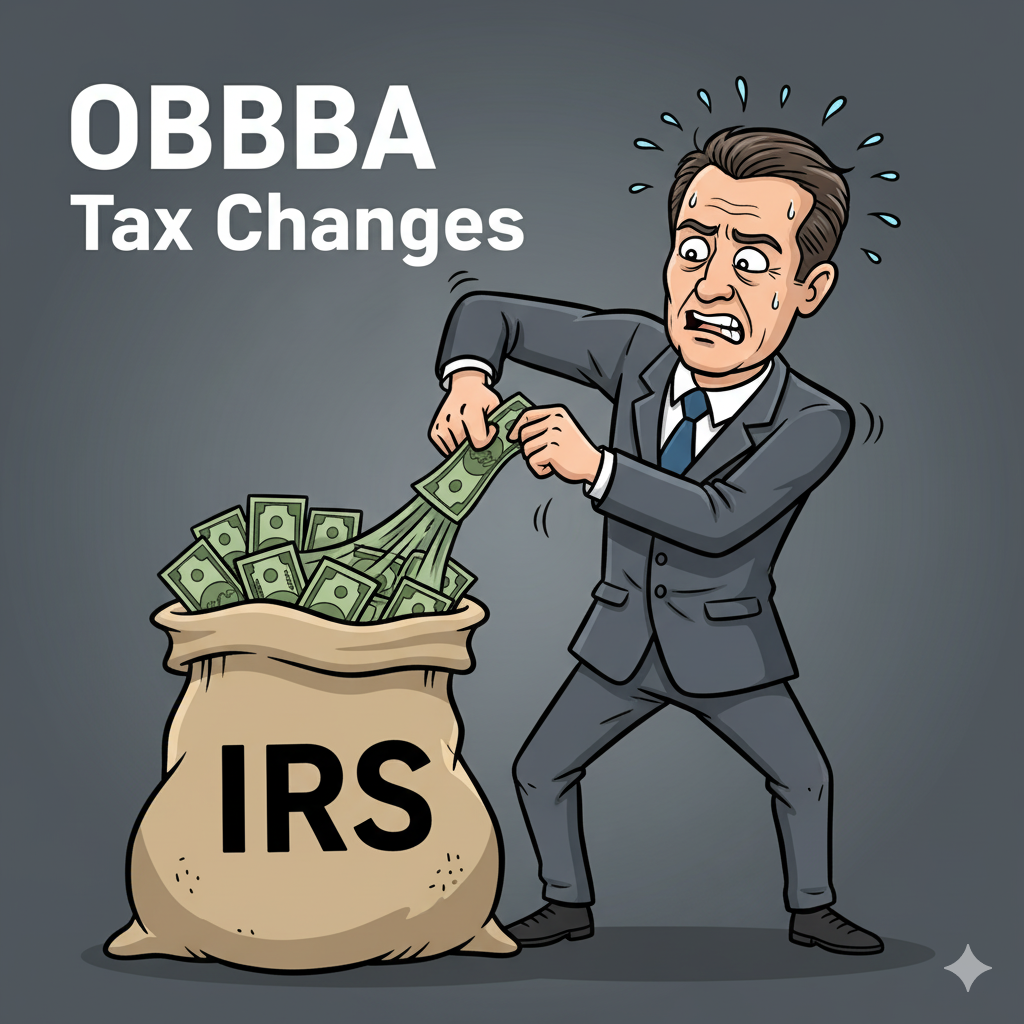Hey folks, if you've been following the tax world lately you've probably heard about the One Big Beautiful Bill Act, dubbed the OBBB. Signed into law earlier this year, (and you can find my first writeup on the benefits here: https://www.oconnorlyon.com/blog/2025/8/8/no-tax-on-social-security-tips-and-overtime-relief-for-seniors-and-service-workers) it's, in part, designed to give working folks a bit of a break on things like tips and overtime pay. But as with most tax changes, you have to scrutinize the details for the projected impact, especially for the 2025 tax year where the IRS implementation won’t be ready for the filing season. Today, I'm diving into its impact, particularly on overtime deductions, and offering some thoughts on how you might need to handle reporting your overtime come tax time. I'll keep it straightforward, with a few examples to illustrate, and I'll be upfront: while the IRS is doing its best under tough circumstances, this could mean extra legwork for taxpayers like you.
First, a quick primer on the OBBB for those who might have missed it. OBBB introduces new deductions aimed at easing the tax burden on everyday earnings. For overtime pay, it allows you to deduct the extra earnings at the time-and-a-half rate, up to $12,500 per year ($25,000 for joint filers). This applies if the overtime is required under the Fair Labor Standards Act and properly reported. It's phased out for higher earners (starting at $150,000 AGI for singles, $300,000 for joint), and it's available whether or not you itemize. Additionally, as you can see from the examples in my prior OBBB article, the potential percentage reduction to a person’s tax is a lot more significant than I would have initially projected.
Similar relief exists for tips, but I'll focus on overtime here since that's where a lot of questions are bubbling up. These provisions kick in for tax years 2025 through 2028, which sounds great on paper, but left the IRS entirely unable to adapt to these mid-year changes for 2025, especially after they’ve lost ¼ of their staffing, but even if the IRS won’t be ready for it, who doesn't love a deduction that kicks in immediately, especially when it’s for overtime?
No Changes to Forms or Withholding for 2025 And Why That's Understandable and IRS 2025 Filing Season Delays
Here's where things get a tad tricky. According to the IRS announcement(which you can find here: https://www.irs.gov/newsroom/irs-announces-no-changes-to-individual-information-returns-or-withholding-tables-for-2025-under-the-one-big-beautiful-bill-act), there won't be any updates to individual information returns like W-2s or 1099s, nor to federal withholding tables, for the 2025 tax year under the OBBB. Employers and payroll providers are instructed to stick with current procedures for reporting and withholding. That means your W-2 at the end of 2025 probably won't have a shiny new box breaking out your qualified overtime pay. Changes like that won’t be released until 2026.
Now, I want to say this sympathetically: the IRS is in a tough spot here. They've lost a huge chunk of their staffing this year, and overhauling forms, systems, and guidance for millions of employers isn't something you do overnight. It's a massive undertaking, e.g. coordinating with software companies, training personnel, and testing everything to avoid additional technical issues during filing season. They're providing transition relief for 2025, which is their way of acknowledging the challenges and helping taxpayers claim these benefits without perfect forms in place.
Additionally, the IRS has already announced that there will be delays in the start of filing season next year, with current projections placing a start date in mid-February, but with nothing confirmed, it could potentially be pushed back even further. Personal plea here, this doesn’t mean you should wait longer to get your taxes started for your 2025 returns, because if everyone takes a few additional weeks to contact their tax preparer and provide their tax documents, that will create a situation where a lot more returns will require extensions because all of that work won’t be achievable on such a tight time-frame.
Claiming the Overtime Deduction: What It Might Look Like for Your 2025 Return
So, if your forms aren't updated, how do you actually claim this deduction? The IRS has promised more guidance in the coming months on how to report OBBB related benefits when filing your 2025 return (due in 2026). Based on similar past transitions, like with COVID-era credits, you'll likely need to calculate the qualified overtime yourself and report it on a schedule or supplemental form attached to your 1040.
Let's break it down with a hypothetical example to make this concrete. Say you're a factory worker earning $20/hour regular pay. In 2025, you log 500 hours of overtime, paid at time-and-a-half ($30/hour). The "premium" portion is that extra $10/hour, totaling $5,000 in deductible overtime pay (well under the $12,500 cap). Your W-2 shows total wages including this, but no separate line for the qualified amount.
To claim it:
You'd tally up your overtime hours from pay stubs or timesheets. Your final pay stub may sum the total amount of overtime for the year for you, so save your pay stubs.
Multiply by the premium rate (half your regular pay).
Subtract that from your AGI on the appropriate schedule, ensuring you don't exceed the cap or hit the phase-out based on your income.
Sounds simple enough, right? But here's where speculation comes in as I'll note that this is based on how the IRS has handled similar deductions in the past, like for educator expenses or student loan interest before forms caught up. I'm assuming the guidance will emphasize self-reporting with supporting documentation, as they can't rely on un-updated employer forms yet.
Speculating on Accounting For and Defending Your Overtime Amounts
This self-reporting opens the door to potential scrutiny, especially if your deduction seems off or if you're audited. Again, speculating here based on IRS patterns: you'll probably need to keep strong records to back up your numbers. Think pay stubs showing hours worked, timesheets verified by your employer, or even FLSA compliant payroll logs. If your job involves variable overtime (like in nursing or construction), you might have to reconcile against your total wages to prove the premium portion.
Take our factory worker example. Suppose the IRS questions that $5,000 deduction. You'd need to provide:
Pay stubs detailing regular vs. overtime hours.
A calculation worksheet showing how you arrived at the premium (e.g., $10/hour x 500 hours = $5,000).
Proof that the overtime was FLSA-mandated, perhaps via your employment contract or company policy.
Additionally, I’d note that if you're self-employed or on 1099s, it is incredibly unlikely that you will be able to take advantage of this overtime deduction in any meaningful way.
I certainly agree that this record keeping may be a bit burdensome, especially when you're already putting in those extra hours just to make ends meet. It feels like even when tax relief is offered, there's still a hurdle to clear. But remember, the IRS isn't out to get you; they're stretched thin and relying on taxpayers to fill in the gaps for 2025. If audits do spike (and they might, as the agency catches up), having your ducks in a row could save you headaches and penalties. Creating and keeping those records now is your best bet as it may be prohibitively difficult to create them a couple years down the road if/when the IRS initiates an audit.
The good news? For 2026, expect updated forms where employers report qualified overtime directly, making this deduction as seamless as, say, your standard withholding. In the meantime, the transition relief should include leniency for good-faith efforts and perhaps reduced penalties if your calculation is reasonable but not perfect.
Wrapping Up: Stay Prepared and Reach Out for Help
The OBBB is a welcome step toward fairer taxes on hard-earned overtime, but the 2025 phase-in means you'll need to be proactive. Start organizing those records now, and keep an eye on IRS.gov for that upcoming guidance. If this all sounds overwhelming, especially if you’re dealing with state taxes on top of it, don't go it alone. Give us a call at The Law Offices of O'Connor & Lyon; we're here to help navigate these changes and ensure you get every deduction you deserve.


